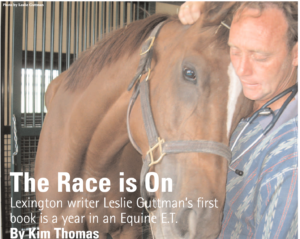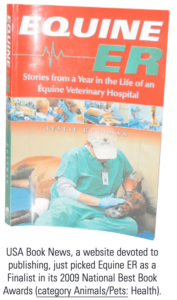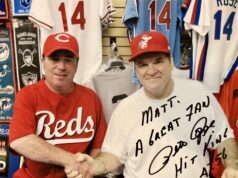In Memory:
Lexington Writer Leslie Guttman has died
Lexington writer Leslie Ruth Guttman died March 14, 2022 with services held on March 17 at Temple Adath Israel. Burial followed at Lexington Cemetery.
Guttman was an award-winning journalist, editor, and author who lived in Lexington’s close-knit Kenwick neighborhood. She was a beloved guest at the local Cornbread Suppers group of writers, artists, and friends.

In October 2009, she was the subject of Kim Thomas’s Ace coverstory about Guttman’s new book, Equine ER, and also published an excerpt of the book to accompany the story.
Thomas, recounting the unforgettable history of the 2008 Derby, wrote, “when Big Brown made his move in the middle of the pack to win, and 
“Eight Belles was the first Thoroughbred to die in 134 years of the Kentucky Derby, and although her tragic story reverberated in the hearts of horse lovers everywhere, the event caused the industry to reconsider some options and changes were and are being made to make tracks and racing safer for these sturdy but delicate athletes.”
EQUINE ER excerpt by Leslie Guttman
Ace October 2009
WORRIES
Dr. Tom Riddle’s up at 4am in foaling season
By Leslie Guttman
Excerpted from Chapter 14 of Equine ER (Eclipse Press, 2009), entitled “Worries,” about Dr. Tom Riddle, co- founder of Lexington’s Rood & Riddle Equine Hospital
Even with Dr. Tom Riddle’s love for the work and his financial success, it is a demanding life. From January through June when it is Thoroughbred foaling and breeding season, Riddle is up at 4am seven days a week, asleep by 9pm. He hates the cold, and the barns are miserably damp and freezing in winter. Although Riddle is home in time for dinner almost every night, it is not a job that you ever turn off.
The other day, while cleaning out his desk at home, he found an old ultrasound picture he’d saved. He was excited, thinking it was a picture of one of his three grown kids. It was of Winning Colors, one of the three fillies that have won the Kentucky Derby. (Winning Colors was also the horse who gave Riddle the worst kick of his life, catching the back of his thigh during a rectal palpation. She didn’t break the leg, but the pain and the bruises stayed for weeks. The roan mare died in 2008 at twenty-three.)
But when I accompanied Riddle on a farm call one summer day, I realized the draw of being an equine veterinarian, at least one in the field, no matter how consuming the job or how ever-present the possibility of getting kicked. It was late August; the weather was clear, no humidity, a flirty breeze. As we drove, miles of blue sky and green pastures unfurled before us. The landscape made me remember what an acquaintance’s niece, coming to Lexington for the first time, said when she looked out the window of her plane as it descended: “I’ve 
(Riddle’s father is also a veterinarian.) It was a small spread. The barn was black with white trim, and worn bridles hung from a row of hooks next to the stalls. A handful of horses lived there. The family was excited to hear the foal was going to be a colt. The only other sounds were birdsongs and the shifting of residents in their stalls. Away from texting, computers and cell phones, and the news of a troubled economy, Riddle’s job felt like that of an old-fashioned country vet in another era. Having just left a big city, I also thought on that day, and on others after it with different vets, about how calming it is to be around horses and other animals, how peaceful they can be and how uncomplicated. Most horses are patient. Most people are not. For college students trying to decide whether to go into human medicine or veterinary, those facts can contribute to making a choice for the latter. Then of course, there’s always one of the big reasons Dr. Katie Garrett, another Rood & Riddle vet, told me why people choose to become doctors of equines rather than of humans, “Patients look a lot better with their clothes off.”
Donations in Leslie Guttman’s memory can be made to Temple Adath Israel, 124 N. Ashland Ave., Lexington, KY 40502 or to Doctors Without Borders.
This article also appears on page 9 of the April 2022 print issue of Ace.






